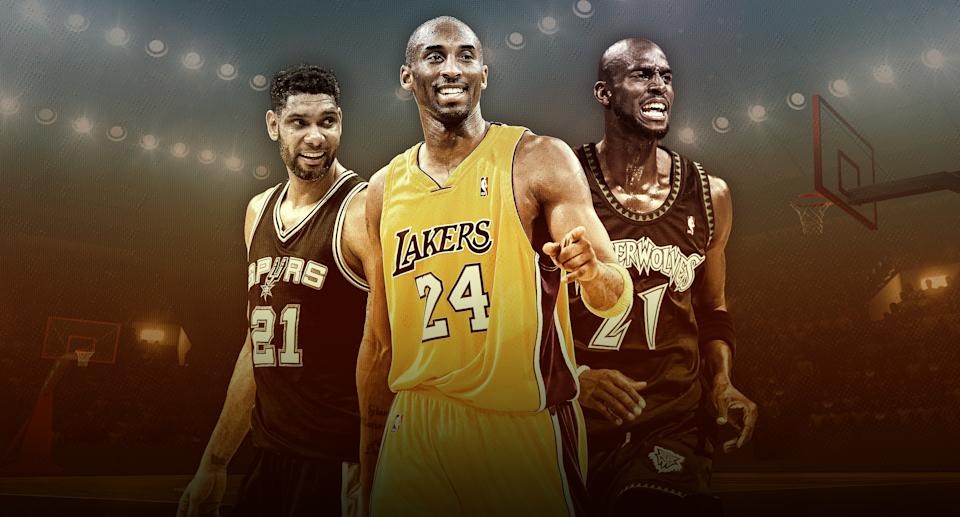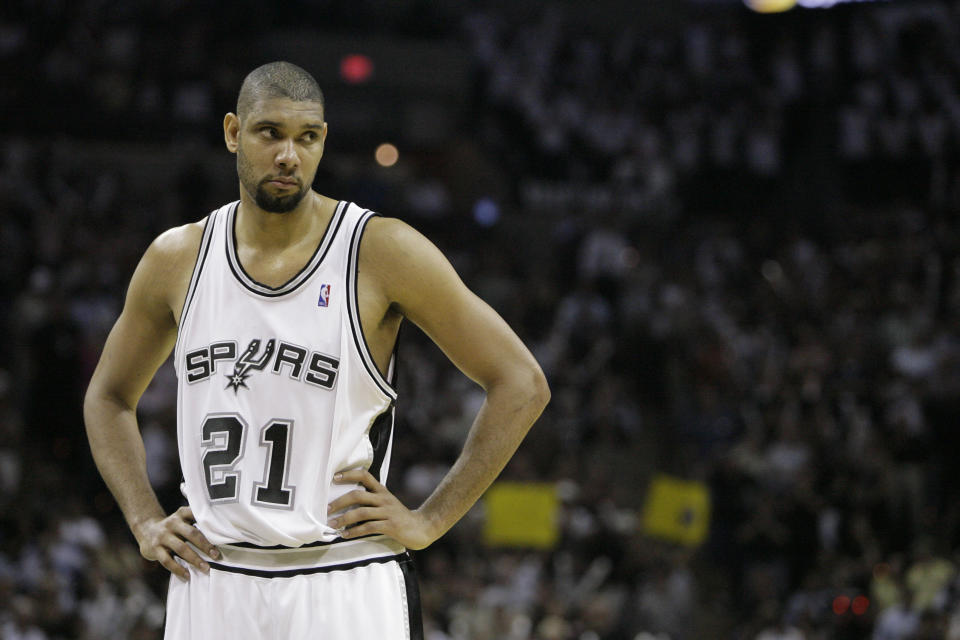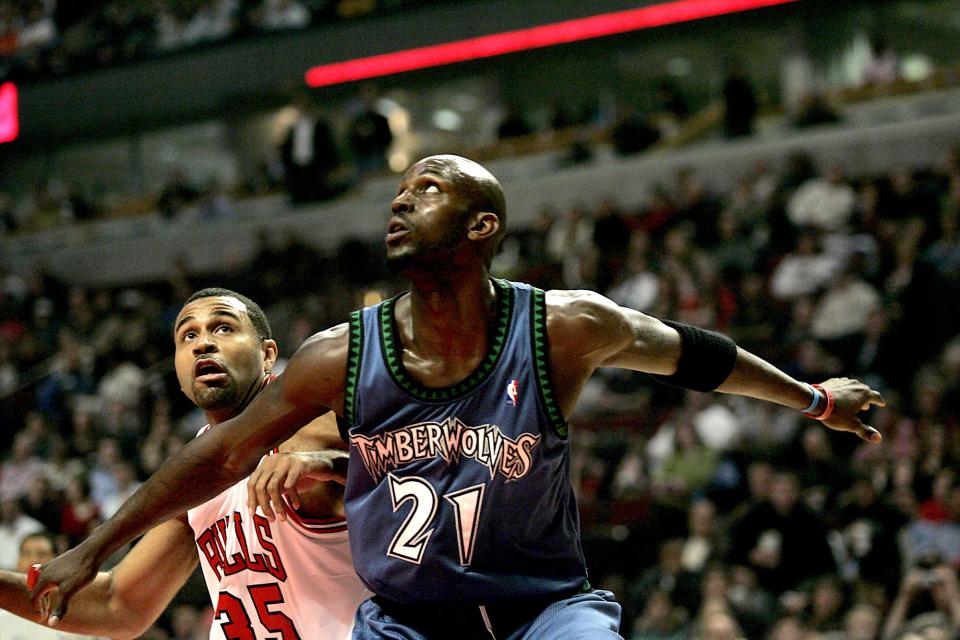An appreciation of soon-to-be Hall of Famers Kobe, Tim and KG
On Saturday, the Naismith Memorial Basketball Hall of Fame is expected to announce the induction of three of the very best to ever play the game. Sure, plenty of legends have entered the Hall, but this class is different. In Kobe Bryant, Tim Duncan and Kevin Garnett, you have the elite of the elite, legends among legends, and three giants whose impact on the game won’t soon be forgotten.

Kobe Bryant
Not many players come to the NBA crowing about their place in history before they have barely established themselves.
But then again, not many ballplayers were as ambitious and eventually as accomplished as Kobe Bryant, who performed as if he were chasing someone from the moment he became a Los Angeles Laker in 1996.
It didn’t matter the general populace knew very little of the Bryant lineage, even though his father, Joe, had a stint in the NBA. He was going to make the world know the name “Kobe” and make it as synonymous as a “Jordan” or “Bird” or “Magic.”
Most people would be happy to be in the same breath as Michael Jordan, but Bryant wasn’t going to be satisfied by merely occupying the same zip code or the same neighborhood. He had the temerity, the arrogance to believe he would eclipse Jordan on the all-time list, the scoring list and every list that mattered in between.
When it comes to natural gifts, there was no competition. Bryant, as great as he was, wasn’t the athletic marvel Jordan was, but he overachieved in the same exact way. Just off talent alone, Bryant should’ve been happy playing in Shaquille O’Neal’s shadow.
But he was as cursed playing next to O’Neal as he was gifted, with some of the greatest individual play post-Jordan occurring in O’Neal’s enormous shadow.
Bryant got the rings, he established himself as undoubtedly the second-best shooting guard behind Jordan on the all-time list and put a huge gap in between whomever came after those two.
But every other evaluation of Bryant may be underrating him (especially the younger version). Consider Bryant at age 24, in the 2002-03 season: 30 points, 6.9 rebounds, 5.9 assists on 45/38/84 splits.
That’s with O’Neal recovering from offseason surgery, and the Lakers having gone through three straight grueling championship runs in an attempt for a four-peat and yet, Bryant wanted to push his body to the extreme.
That was the season when he had nine consecutive 40-point games. It gets lost even in his 10-year peak in which his 2008 MVP season pales statistically to his best of the best days.
From 2001-08: 29 points, 5.9 rebounds and 5.3 assists, while also consistently being a defensive monster.
It’s been whispered that the Lakers’ depth and size on the frontline with Pau Gasol, Lamar Odom and Andrew Bynum meant more than Bryant in those Lakers title teams in 2009 and 2010, and there’s a level of merit to that, considering size meant more then than it does in today’s game.
But Bryant was the spirit of that team, he drove it, he willed it and no contemporary facsimile would’ve pulled off what he led the Lakers to.
He didn’t pass Jordan, but he’s 10th on my all-time list, the only player besides Jordan who’s shorter than 6-foot-9, fulfilling his own prophecy.
— Vincent Goodwill

Tim Duncan
Stars of the highest magnitude have résumés that separate them from the flock, but among the NBA’s 99th percentile, numbers and trophies are a rote accessory — a badge that allows entry into the room but carries little significance inside it.
Tim Duncan is a two-time MVP, three-time Finals MVP and 15-time All Star with a literal handful of rings, but the details are what separate him from Kobe Bryant and Kevin Garnett: The Spurs won titles in three different decades with Duncan at the helm. In his 19 seasons, the Spurs went to the playoffs 19 times.
Duncan steered the NBA’s most successful ship through exhibortant league-wide changes made manageable by head coach Gregg Popovich’s engineering and his best player’s flexibility. Duncan split his years between offensive tentpole and defensive anchor, between postup bruiser and pick-and-pop shooter, between center and power forward. He was the main event and then, with the arrivals of Manu Ginobili, Tony Parker and Kawhi Leonard, the conduit.
Off the court and inside the locker room, Duncan scanned his team's spirit for holes he could plug. He is a private man in a public arena, often chided for being boring, a persona the buttoned-up Spurs were happy to keep well-oiled until his retirement ceremony, when the co-workers who knew him best provided insight into a side of Duncan few know.
Parker told the crowd at the AT&T Center about the times Duncan saved a younger, more fragile and undisciplined Parker from the taciturn Popovich’s wrath. When Duncan couldn’t save him, the walking release valve would hug Parker and pat him on the back later. Ginobili also attested to Duncan walking them through the tougher, earlier years of adjusting to Popovich’s “mental tests.” During the 2006 playoffs, Ginobili committed a turnover that lost the Spurs a game. “I wanted to vanish,” Ginobili told the crowd. He turned his cell off after the game and went straight to his room, but Duncan called his hotel line five times. He forced Ginobili out of his room for dinner and helped him forget what happened. Popovich closed by thanking Duncan for taking a consistent pounding and giving him the runway necessary to coach a team hard.
If the NBA season doesn’t continue, the Spurs will finish 12th in the Western Conference, falling out of the playoff pecking order for the first time in 22 years. San Antonio replaced Duncan with LaMarcus Aldridge, whose rigid adherence to archaic midrange shots and postups has left the team stuck in 2011. In 2018, Leonard forced his way out due, officially, to insurmountable trust issues with the medical staff.
You can’t draw a perfect through-line between Duncan’s departure and the Spurs’ demise, but good leadership, by nature, is difficult to prove: evident in the scandals that didn’t happen, conflicts that never materialized.
Duncan was observant, efficient, saving expression for when it mattered most. Where the Spurs were and where they are now is a testament to Duncan’s greatness and to the power of his presence.
— Seerat Sohi

Kevin Garnett
Passion, intensity and relentless verbal sparring are three characteristics that define Kevin Garnett.
He’s one of only four players in NBA history to be named league MVP and Defensive Player of the Year. Although he wasn’t the first player to go straight to the NBA from high school in 1995, it was his entry that started the trend that led to Kobe Bryant, Tracy McGrady, LeBron James and Dwight Howard following suit.
Listed at 6-feet-11, he was one of the first players of his kind to exhibit guard-like skills and responsibilities, sometimes bringing up the ball to initiate the offense.
Power forwards in his time carried sturdy frames, the opposite of Garnett’s lean, wiry body type. Still, he used his slender physique to maneuver around opponents with a tight handle and quick feet, and he had a jump shot that was virtually impossible to block.
The knock on his game was that he was too unselfish because he really could get any shot he wanted at any given time. He’s the only player in history to record at least 25,000 points, 10,000 rebounds, 5,000 assists, 1,500 steals and 1,500 blocks, and he’s one of three players all time to lead his team in the five major statistical categories for a season, leading the Minnesota Timberwolves in points, rebounds, assists, steals, and blocks in 2002-03.
Garnett’s career is quite significant off the court, and it’s still relevant in today’s player empowerment era.
When contemplating their own futures, star players often refer to the loyalty Garnett displayed in spending 12 years with the Minnesota Timberwolves and never advancing past the conference finals. More than a decade of his prime was widely regular-season viewing.
In 2007, he reluctantly accepted a trade to the Boston Celtics, where a potent Big 3 was formed with Paul Pierce and Ray Allen, and they won an NBA title in their first season together in 2008. Garnett would share with teammates how he regretted not making the move earlier in his career.
Garnett’s decision was the blueprint for one of the biggest and most controversial offseason moves in league history, when James, 25, bolted the Cleveland Cavaliers in 2010 after seven seasons to join the Miami Heat and form their own Big 3 with Dwyane Wade and Chris Bosh.
In many regards, Garnett is one of the most influential players in basketball history.
As for his pecking order among the game’s elite, Garnett is arguably the most versatile player to have ever set foot on a basketball court. If it were not for Duncan’s reign, Garnett probably would be considered the best power forward of all time.
And that “probably” qualifier is because some believe Dirk Nowitzki has a legitimate argument. But given Garnett’s dominance at both ends of the floor, I’d give him the nod.
There has never been anyone like Garnett, and it will likely remain that way.
— Chris Haynes
More from Yahoo Sports:


